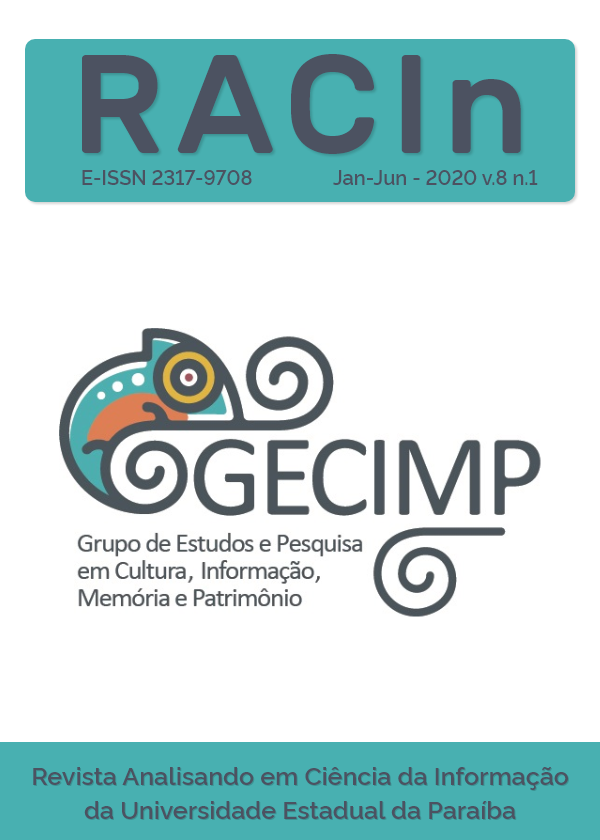FATHER ERIVALDO AND THE KETU CANDOMBLÉ IN PARAÍBA
AFRO-BRAZILIAN MEMORIES AND IDENTITIES
Keywords:
Social memory, Afro-brazilian identity, African Ketu nation cult, Father ErivaldoAbstract
This work aims to understand the aspects of the traditional African cult of the Ketu nation in the city of João Pessoa whose leader is the babalorixá José Erivaldo da Silva, founder of Kessi Ilê Axé Oxum Odenitá, "mother house". The aspects of the life of Father Erivaldo of Oxum and the characteristics of the ritual foreseen in the cult of the Ketu nation are highlighted in this work, providing visibility to the memory committed to cultural and religious diversity. Father Erivaldo has the largest egbé (Family of Saint of Paraíba). He is a militant in support of the cause of respect for religious diversity and against intolerance through actions in research groups and INTECAB (National Institute of Afro-Brazilian Tradition and Culture) where he was president. As to the methodology adopted in the research, it was exploratory, descriptive and of qualitative nature, using the theoretical and methodological foundations of research in Social Memory and Identity. We believe that opening spaces for dialogues, promoting and giving voices to people who are historically excluded is an exercise of citizenship, an affirmative practice that needs to be carried out more often, offering new perspectives.
References
ASSMAN, Aleida. Espaços da recordação: formas e transformações da memória cultural. Campinas: Unicamp, 2011.
CANDAU, Joël. Memória e identidade. São Paulo: Contexto, 2011.
CAPUTO, Stela Guedes; PASSOS, Mailsa. Cultura e conhecimento em terreiros de Candomblé: lendo e conversando com Mãe Beata de Yemonjá. Currículo sem Fronteiras, v. 7, n. 2, p. 93-111, jul./dez. 2007.
FARIAS, Juliana Barreto. Cidades negras: africanos, crioulos e espaços urbanos no Brasil escravista do século XIX. São Paulo: Alameda, 2006.
HALBWACHS, Maurice. A memória coletiva. São Paulo: Centauto, 2004.
HALL, Stuart. A identidade cultural na pós-modernidade. Rio de Janeiro: DP&A, 1998.
JOVLOVITCHE, Sandra; BAUER, Martin W. Entrevista narrativa In: Pesquisa qualitativa com texto, imagem e som: um manual prático. 7. ed. Petrópolis: Vozes, 2008.
LOPES, Nei. Novo dicionário banto no Brasil. Rio de Janeiro: Pallas, 2003.
MINAYO, M. C. S. Análise qualitativa: teoria, passos e fidedignidade. In: Pesquisa social: teoria, método e criatividade. Petrópolis: Vozes, 2012.
NORA, P. Entre memória e história: a problemática dos lugares. Projeto História - Revista do Programa de Estudos de Pós-graduados em História do Departamento de História, São Paulo, v. 10, 1993. Disponível em: http://www.pucsp.br/projetohistoria/downloads/revista/PHistoria10.pdf. Acesso em: 12 jul. 2019.
POLLAK, Michael. Memória, esquecimento e silêncio. Estudos Históricos, Rio de Janeiro, n. 3, v. 2, p. 3-15, 1989.
PAI ERIVALDO. Candomblé de Ketu na Paraíba [ago. 2010]. Entrevistador: Valdir de Lima Silva. João Pessoa, 2010. Mídia digital.
PRANDI, Reginaldo. As religiões afro-brasileiras e seus seguidores. Porto Alegre, Civitas, v. 3, n. 1, jun. 2003.
REIS, João J. Magia Jeje na Bahia: a invasão ao Calundu do Pasto de Cachoeira, 1785. Revista Brasileira de História, v. 8, n. 16, p. 55-87, 1988.
RIBEIRO, René. Cultos afro-brasileiros do Recife. Recife: Instituto Joaquim Nabuco de Pesquisas Sociais, 1978.
RIBEIRO, Ronilda Iya Kemi. Alma africana no Brasil: os Iorubás. São Paulo: Oduduwa, 1996.
Downloads
Published
How to Cite
Issue
Section
License
Copyright (c) 2024 Revista Analisando em Ciência da Informação

This work is licensed under a Creative Commons Attribution-NonCommercial-NoDerivatives 4.0 International License.
As publicações da RACIn estão licenciados sob a Licença Creative Commons CC BY-NC.





